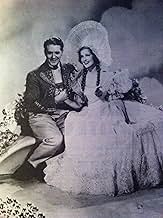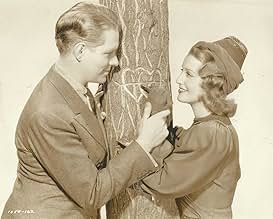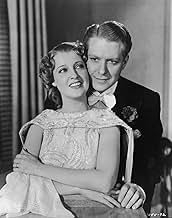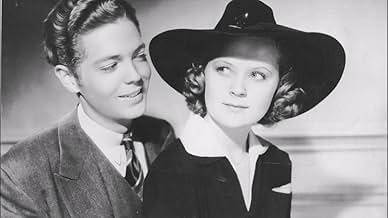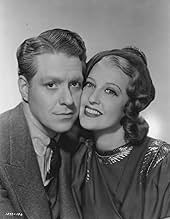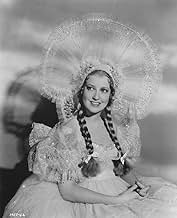अपनी भाषा में प्लॉट जोड़ेंThe team behind a successful Broadway production tries to stop the married stars from transitioning to Hollywood.The team behind a successful Broadway production tries to stop the married stars from transitioning to Hollywood.The team behind a successful Broadway production tries to stop the married stars from transitioning to Hollywood.
- 2 ऑस्कर के लिए नामांकित
- 5 जीत और कुल 2 नामांकन
फ़ीचर्ड समीक्षाएं
In glorious Technicolor,the stars are probably at their best,exceeding such romances as "New Moon","Rose Marie" and the others. Production values are enormous,beginning with a dance by Ray Bolger to a Dutch background heightened in color by beds of tulips.They are just enough not to be overwhelming. Jean and Nelson are the stars in the film of the sixth year of the stage production of Victor Herbert's 1913 show "Sweethearts" and are being done to death by the importunities of radio,recording,and family demands. Frank Morgan is his usual perplexed and harassed self as the stage producer,Herman Bing and Misha Auer are in top form as a mutually fighting conductor and wannabe playwright. One delightful vignette is during her modelling session at a dressmaker's shop,where she shows off the various colors and styles for different occasions. One gem is Eddy's race,pursued by speed cops,in a taxi from recording studio to NBC radio (looking much then as now) where Jeanette awaits him,having just broadcast Herbert's "Badinage" ably accompanied with much panache by Dalies Frantz.Some of her old Lubitsch (Director "Merry Widow"et al.) sassiness comes out as she mimes with the audience, until Eddy arrives, looking like a naughty schoolboy,with sleeve pulled up arm' amid her tidying of his appearance. One of the nicest shots is down the staircase at their home during the duet of "Little Gray home in the West",one of the most sincere performances. Herbert Stothart deserves much credit for his arrangement of Herbert's melodies,the duets and the delightful continuous orchestrations of the sound track. I would certainly watch this masterpiece several times.
Sweethearts was the first color film for Nelson & Jeanette, and they, and the film are quite beautiful.They portray a married couple, appearing in musical comedy. This shows Nelson at his most playful--the "Pretty as A Picture" duet was so personal, I thought I was privy to a private moment between them. Too bad, MGM never took advantage of Nelson's self depreciating talent, but this film is most interesting, because it gives us a fascinating glimpse of what might have been.
A high-budget offering for MGM stars Nelson Eddy and Jeanette Macdonald, and the studio's first film to be released in Technicolor (Maytime had been started but not completed in this process), centres on a lovey-dovey couple who have worked for years in a Broadway success and are offered the chance to work in Hollywood. How do their theatre collaborators stop them going there?
Unusually for films featuring the Singing Sweethearts, this one has a sparky and funny script (largely by Dorothy Parker and Alan Campbell) from which it benefits. Not many songs have survived from the Broadway production of the real 'Sweethearts' (sadly, the omissions include 'The Cricket on the Hearth', which was really quite a sweet song), and others have been added to flesh out the Hollywood fantasy. Perhaps the best numbers are 'Pretty as a Picture' and 'On Parade'.
In support are Frank Morgan ('the Wizard of Oz'), Ray Bolger (not used anywhere near enough), and the poor man's Eddy and Macdonald, Douglas MacPhail and Betty Jaynes, who suffer from a total lack of charisma. The leads themselves are fine and do with the more meaty than usual material. Perhaps their more slushy collaborations such as 'Rose Marie' and 'Maytime' are better overall, but 'Sweethearts' is definitely worth a look.
Unusually for films featuring the Singing Sweethearts, this one has a sparky and funny script (largely by Dorothy Parker and Alan Campbell) from which it benefits. Not many songs have survived from the Broadway production of the real 'Sweethearts' (sadly, the omissions include 'The Cricket on the Hearth', which was really quite a sweet song), and others have been added to flesh out the Hollywood fantasy. Perhaps the best numbers are 'Pretty as a Picture' and 'On Parade'.
In support are Frank Morgan ('the Wizard of Oz'), Ray Bolger (not used anywhere near enough), and the poor man's Eddy and Macdonald, Douglas MacPhail and Betty Jaynes, who suffer from a total lack of charisma. The leads themselves are fine and do with the more meaty than usual material. Perhaps their more slushy collaborations such as 'Rose Marie' and 'Maytime' are better overall, but 'Sweethearts' is definitely worth a look.
Sweethearts is the first of two of the Jeanette MacDonald/Nelson Eddy films to be done in technicolor, the second at last being Bittersweet. It is also the first MGM film done in modern technicolor, though in Jeanette's The Cat and the Fiddle, the last 10 minutes were in color. And it is the only one of their films besides Bittersweet where they start off as man and wife.
The original operetta by Victor Herbert was done in 1913 and it was in fact a story set in Holland as the numbers do show. But this film is like the later one Nelson did with Rise Stevens, The Chocolate Soldier, in that he and Stevens are husband and wife appearing in The Chocolate Soldier while the plot of that is taken from Ferenc Molnar's The Guardsman.
Sweethearts has an original script by Dorothy Parker and it involves two happily married singing co-stars of a long running operetta, named Sweethearts. They've been appearing on Broadway for seven years in the same show.
In fact a whole cottage industry has grown up around Sweethearts. Producer Frank Morgan, songwriter Herman Bing, librettist Mischa Auer have had it real good for seven years. They've been quite content to live off the box office of Sweethearts as long as MacDonald and Eddy keep appearing. Also the extended families of both Eddy and MacDonald live off of them as well.
When Reginald Gardiner woos them on behalf of Hollywood producer George Barbier, panic ensues among the ranks of the cottage industry. These people might actually have to go to work.
Knowing Dorothy Parker wrote 50% of the script, you can imagine it is a witty one. Jeanette and Nelson are in good voice and the musical calls for a large number of duets. They sing the title song, For Every Lover Meets His Fate, and an interpolated non Victor Herbert song, Our Little Grey Home in the West in anticipation of their California excursion. In addition Jeanette sings A Summer Serenade which was originally an instrumental Victor Herbert composition entitled Badinage. Robert Wright and Chet Forrest gave it some lyrics for the film. Nelson has a good typical Nelson marching song in On Parade.
After appearing with Nelson Eddy in Rosalie as a sidekick Ray Bolger didn't have as many scenes, but got to show his dancing talent a lot more in the Wooden Shoes number. Jeanette personally interceded with Louis B. Mayer and got Douglas MacPhail and Betty Jaynes cast as their understudies.
MacPhail and Jaynes married later on, but divorced after MacPhail's career took a nosedive in the early Forties. He was a good singer who you might remember appeared with Mickey Rooney and Judy Garland in Babes in Arms and later introduced the Cole Porter classic, I Concentrate on You in Broadway Melody of 1940. Tragically he took his own life after the divorce for God only knows what reasons.
For Jeanette and Nelson fans and for those who like to see Ray Bolger in something else besides The Wizard of Oz, Sweethearts in highly recommended.
The original operetta by Victor Herbert was done in 1913 and it was in fact a story set in Holland as the numbers do show. But this film is like the later one Nelson did with Rise Stevens, The Chocolate Soldier, in that he and Stevens are husband and wife appearing in The Chocolate Soldier while the plot of that is taken from Ferenc Molnar's The Guardsman.
Sweethearts has an original script by Dorothy Parker and it involves two happily married singing co-stars of a long running operetta, named Sweethearts. They've been appearing on Broadway for seven years in the same show.
In fact a whole cottage industry has grown up around Sweethearts. Producer Frank Morgan, songwriter Herman Bing, librettist Mischa Auer have had it real good for seven years. They've been quite content to live off the box office of Sweethearts as long as MacDonald and Eddy keep appearing. Also the extended families of both Eddy and MacDonald live off of them as well.
When Reginald Gardiner woos them on behalf of Hollywood producer George Barbier, panic ensues among the ranks of the cottage industry. These people might actually have to go to work.
Knowing Dorothy Parker wrote 50% of the script, you can imagine it is a witty one. Jeanette and Nelson are in good voice and the musical calls for a large number of duets. They sing the title song, For Every Lover Meets His Fate, and an interpolated non Victor Herbert song, Our Little Grey Home in the West in anticipation of their California excursion. In addition Jeanette sings A Summer Serenade which was originally an instrumental Victor Herbert composition entitled Badinage. Robert Wright and Chet Forrest gave it some lyrics for the film. Nelson has a good typical Nelson marching song in On Parade.
After appearing with Nelson Eddy in Rosalie as a sidekick Ray Bolger didn't have as many scenes, but got to show his dancing talent a lot more in the Wooden Shoes number. Jeanette personally interceded with Louis B. Mayer and got Douglas MacPhail and Betty Jaynes cast as their understudies.
MacPhail and Jaynes married later on, but divorced after MacPhail's career took a nosedive in the early Forties. He was a good singer who you might remember appeared with Mickey Rooney and Judy Garland in Babes in Arms and later introduced the Cole Porter classic, I Concentrate on You in Broadway Melody of 1940. Tragically he took his own life after the divorce for God only knows what reasons.
For Jeanette and Nelson fans and for those who like to see Ray Bolger in something else besides The Wizard of Oz, Sweethearts in highly recommended.
This one is notable for being MGM's first Technicolor movie. "Sweethearts" won cinematographers Oliver Marsh and Allan Davey special Oscars for their work with color film. MacDonald looks gorgeous--black and white didn't do her justice.
The music is pleasant enough, but not memorable. The couple is nauseatingly in love through the first hour, starring in a long running Broadway production - "Sweethearts". Unable to find rest during their six year production, the two are enticed to go to Hollywood instead, being promised lots of breaks between films. The normally feuding creative forces/producers of "Sweethearts" realize that this is the end of the gravy train, so they hatch a plan to keep the two from leaving. Complications ensue.
When MacDonald and Eddy aren't singing, the film seems endless. Not even the scenes with animals make this amusing. Eddy is the one who brings off some sight gags--three of them to be exact. Frank Morgan and the rest of the cast are stranded without any funny lines. They just made me groan--and I'm an easy laugher. It's hard to make Frank Morgan unfunny.
Trivia I noticed--the opening operetta is on the same set that "The Great Ziegfeld" (1936) used for the "A Pretty Girl Is Like A Melody" number. There is a lengthy end credit explaining that the actors on the screen didn't write the 1913 operetta "Sweethearts". MacDonald has a five minute fashion show and proves she looks good in any outfit, no matter how misguided.
If you see this, watch the first thirty minutes and the fashion show for the cinematographers playing with colors, then fast forward between songs.
The music is pleasant enough, but not memorable. The couple is nauseatingly in love through the first hour, starring in a long running Broadway production - "Sweethearts". Unable to find rest during their six year production, the two are enticed to go to Hollywood instead, being promised lots of breaks between films. The normally feuding creative forces/producers of "Sweethearts" realize that this is the end of the gravy train, so they hatch a plan to keep the two from leaving. Complications ensue.
When MacDonald and Eddy aren't singing, the film seems endless. Not even the scenes with animals make this amusing. Eddy is the one who brings off some sight gags--three of them to be exact. Frank Morgan and the rest of the cast are stranded without any funny lines. They just made me groan--and I'm an easy laugher. It's hard to make Frank Morgan unfunny.
Trivia I noticed--the opening operetta is on the same set that "The Great Ziegfeld" (1936) used for the "A Pretty Girl Is Like A Melody" number. There is a lengthy end credit explaining that the actors on the screen didn't write the 1913 operetta "Sweethearts". MacDonald has a five minute fashion show and proves she looks good in any outfit, no matter how misguided.
If you see this, watch the first thirty minutes and the fashion show for the cinematographers playing with colors, then fast forward between songs.
क्या आपको पता है
- ट्रिवियाThis is MGM's first full-length film to feature a different lion roaring in the logo, by the name of Tanner. He appeared at the beginning of MGM's Technicolor feature films and cartoons from 1936 to 1956 and later, from 1963 to 1967.
- भाव
Felix Lehman: [Counting on Gwen and Ernest's gullibility] I'm an old man and I don't get many pleasures, but you go ahead. Just think about yourselves. Forget about me.
- क्रेज़ी क्रेडिटA written epilogue explains: "In our screen play, certain dramatic liberties have been taken with the operetta 'SWEETHEARTS'. We depict the scenes from the operetta as though it was a recent production presented by a wholly fictitious producer Felix Lehman and composed and written by two wholly imaginary persons Oscar Engel and Leo Kronk whereas the stage operetta 'SWEETHEARTS' was actually written and produced on the stage about 1913, Victor Herbert composing the music and Frédérique De Grésac (as Fred de Gresac), Robert B. Smith and Harry B. Smith writing the book and lyrics."
- कनेक्शनFeatured in Nelson and Jeanette (1993)
- साउंडट्रैकSweethearts
(1938) (uncredited)
Music by Victor Herbert (1913)
Lyrics by Bob Wright and Chet Forrest
Played during the opening credits and often in the score
Performed by Jeanette MacDonald and Nelson Eddy
Reprised by them for a radio broadcast with chorus
Later sung by MacDonald with Douglas McPhail and Eddy with Betty Jaynes
टॉप पसंद
रेटिंग देने के लिए साइन-इन करें और वैयक्तिकृत सुझावों के लिए वॉचलिस्ट करें
विवरण
- रिलीज़ की तारीख़
- कंट्री ऑफ़ ओरिजिन
- भाषा
- इस रूप में भी जाना जाता है
- Ljubavnici
- फ़िल्माने की जगहें
- उत्पादन कंपनी
- IMDbPro पर और कंपनी क्रेडिट देखें
- चलने की अवधि1 घंटा 54 मिनट
- रंग
- पक्ष अनुपात
- 1.37 : 1
इस पेज में योगदान दें
किसी बदलाव का सुझाव दें या अनुपलब्ध कॉन्टेंट जोड़ें


